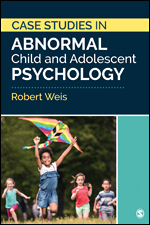Case Studies in Abnormal Child and Adolescent Psychology
First Edition
Robert Weis - Denison University, USA
Robert Weis - Denison University, USA
136 pages
| September, 2020
| SAGE Publications, Inc
Instant Access!
eBook
ISBN: 9781071808177
Paperback
ISBN: 9781071808146
$65.00
Instant Access!
eBook
ISBN: 9781071808177
Case Studies in Abnormal Child and Adolescent Psychology is designed to accompany the textbook Introduction to Abnormal Child and Adolescent Psychology by Robert Weis. Clinical case examples based on real children and parents pair with chapters in the core text to illustrate principles of developmental psychopathology, psychological assessment, evidence-based treatment, and examples of specifics disorders prevalent in children and adolescents. These brief cases, modeled after the same format as DSM-5 clinical cases, are paired with a series of discussion questions that can be used as in-class activities, discussion starters, writing assignments, or exam questions.
Available formats
ISBN: 9781071808177
eBook
Suggested Retail Price: $26.00
Bookstore Price: $20.80
ISBN: 9781071808177
eBook
Suggested Retail Price: $33.00
Bookstore Price: $26.40
ISBN: 9781071808177
eBook
Suggested Retail Price: $30.00
Bookstore Price: $24.00
ISBN: 9781071808177
eBook
Suggested Retail Price: $47.85
Bookstore Price: $38.28
ISBN: 9781071808146
Paperback
Suggested Retail Price: $65.00
Bookstore Price: $52.00
See what’s new to this edition by selecting the Features tab on this page. Should you need additional information or have questions regarding the HEOA information provided for this title, including what is new to this edition, please email sageheoa@sagepub.com. Please include your name, contact information, and the name of the title for which you would like more information. For information on the HEOA, please go to http://ed.gov/policy/highered/leg/hea08/index.html.
For assistance with your order: Please email us at textsales@sagepub.com or connect with your SAGE representative.
SAGE
2455 Teller Road
Thousand Oaks, CA 91320
www.sagepub.com
PART I: CONCEPTS, METHODS, AND THEORIES
Chapter 1: The Science and Practice of Abnormal Child Psychology
Chapter 2: The Causes of Childhood Disorders
Chapter 3: Research Methods with Children and Families
Chapter 4: Assessing and Treating Children’s Problems
PART II: CASE STUDIES OF CHILDREN AND ADOLESCENTS
Chapter 5: Intellectual Disability & Developmental Disorders
Chapter 6: Autism Spectrum Disorder (ASD)
Chapter 7: Communication & Learning Disorders
Chapter 8: Attention-Deficit/Hyperactivity Disorder
Chapter 9: Conduct Problems in Children and Adolescents
Chapter 10: Substance Use Problems in Adolescents
Chapter 11: Anxiety Disorders and Obsessive-Compulsive Disorder
Chapter 12: Trauma-Related Disorders
Chapter 13: Depression, Suicide, and Self-Injury
Chapter 14: Pediatric Bipolar Disorders & Schizophrenia
Chapter 15: Feeding & Eating Disorders
Chapter 16: Health-Related Disorders & Pediatric Psychology
- Case studies based on real children provide realistic examples for students to pair with chapter readings.
- Short case studies modeled after DSM-5 clinical cases provide flexibility for instructors to assign these as in- or out-of-class assignments.
- Discussion questions paired with each case provide opportunities for critical thinking and analysis.

